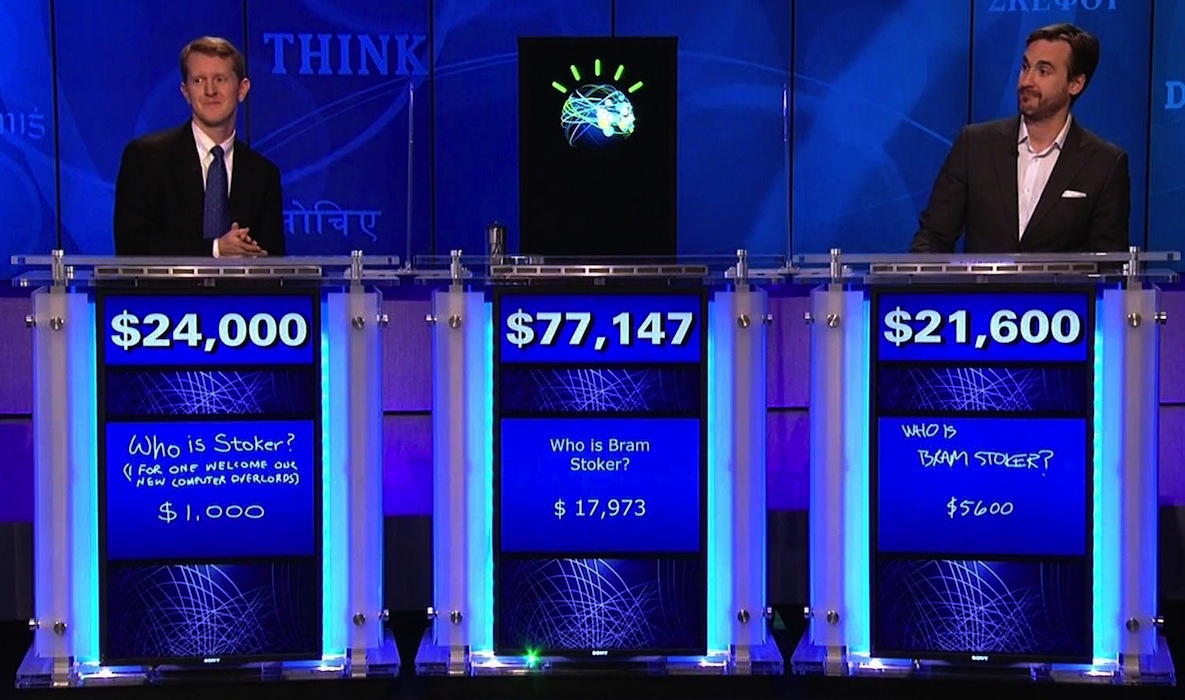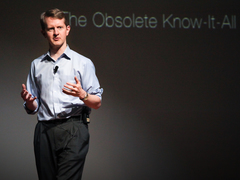
Ken Jennings (left) faces off against supercomputer Watson (center) and his fellow Jeopardy champion, Brad Rutter (right).
Perhaps you know Ken Jennings by name, perhaps you simply know him as “that guy with the winning streak on Jeopardy.” In 2004, this trivia enthusiast won an incredible 74 consecutive times on Jeopardy, setting the record as the classic game show’s most winning contestant and securing the Guinness World Record at the time for “most cash won on a game show.”
 Ken Jennings: Watson, Jeopardy and me, the obsolete know-it-all
In today’s talk, he shares how he became obsessed with trivia as a young child.
Ken Jennings: Watson, Jeopardy and me, the obsolete know-it-all
In today’s talk, he shares how he became obsessed with trivia as a young child.
“I remember being able to play Trivial Pursuit against my parents and hold my own,” says Jennings in this talk, given at TEDxSeattleU. “There’s a weird sense of mastery you get when you know some …. Beattles factoid that dad didn’t know. You think, ‘Aha. Knowledge really is power.’”
In 2011, however, Jenning’s legacy changed when he accepted a match against the IBM supercomputer, Watson.
“I was pretty confident that I was going to win,” says Jennings of how he felt going into the match. “I had taken some Artificial Intelligence classes and I knew there were no computers that could do what you need to do to win on Jeopardy. People don’t realize how tough it is to write that kind of program that can read a clue in a natural language like English — to understand the puns, the red herrings, to unpack just the meaning of the clue … I thought, ‘Yes I will come destroy the computer.’”
But that’s not exactly what happened. To hear how the match what down (interestingly, Jennings said it had an energy far more like a basketball game than a game show) and the profound lessons Jennings learned from it about the state of knowledge, watch this hilarious talk.
Shortly after the Jennings-Watson showdown in 2011, TED hosted a panel of IBM experts and insiders about the supercomputer and its Jeopardy victory. Below, see the discussion between Final Jeopardy: Man vs. Machine author Stephen Baker, Watson’s principal investigator Dr. David Ferrucci, IBM Fellow Kerrie Holley and Columbia professor Herbert Chase.
So how did it feel to lose to Watson? Jennings shares in this talk.
“I felt obsolete,” he reveals. “I felt like a Detroit factory worker in the ‘80s seeing a robot that could now do his job on the assembly line. I felt like ‘Quiz Show Contestant’ was now the first job that had become obsolete under this new regime of thinking computers.”
Comments (171)
Pingback: IBM, Salesforce Strike Global Partnership on Cloud, AI
Pingback: Chained to the Algorithms – *Footnote Four
Pingback: Robots and Artificial Intelligence Are Going to Radically Change Life as We Know It • John Akers
Pingback: Competitive Intelligence – Artificial Intelligence: Can IBM’s Watson Do It All? – Inteligência Competitiva por Alfredo Passos
Pingback: Can IBM's Watson Do It All? | Fast Company | Business + Innovation
Pingback: Can IBM's Watson Do It All? | Grabber
Pingback: Can IBM's Watson Do It All? | SocialMediaGlue
Pingback: クラウドとはイノベーションのためのデジタルプラットフォームです | Bluemix ブログ
Pingback: Watson claims to predict cancer, but who trained it to ‘think?’ | Tech Bit
Pingback: Watson claims to predict cancer, but who trained it to 'think?' – Recode
Pingback: Watson claims to predict cancer, but who trained it to 'think?' – Recode | Bankingre
Pingback: Watson claims to predict cancer, but who trained it to 'think'? – Recode | BLLMNews
Pingback: Journal
Pingback: How Artificial Intelligence will Revolutionize Healthcare – Simple Invest Asia
Pingback: Smartphone AI Won't Save Your Life in a Crisis | Chop Dawg
Pingback: 4 Recipes Created By A Supercomputer | cosmetic of charlenik
Pingback: When Computers Started Beating Chess Champions – The Atlantic | Quick & Fast Sports News
Pingback: When Computers Started Beating Chess Champions – Castwb
Pingback: Roasted Corn and Summer Peach Salad | The Family Meal
Pingback: ARTIFICIAL INTELLIGENCE: Jeopardy champion a cancer expert as IBM … – Vancouver Sun (blog) | World Prime Trends